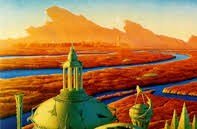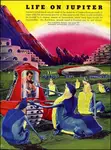A RETURN TO
BRADBURY’S MARS:
dylan jeninga's
Thoughts on
The
Ugly Duckling
by Matthew Hughes
the second story in the anthology Old Mars

The Martian Chronicles by Ray Bradbury is the kind of Martian novel I can lend to friends who aren’t OSS fans and still be confident that they will enjoy it. After all who, even if they do not love Mars, does not feel dismay at the vanishing of the rainforests, or the destruction of native cultures? That feeling of loss, I think, is universal.
Loss is a central theme of this special book. Despite their similarities, a cosmic divide exists between men and Martians, and very few from Earth take the time to really understand the people of Mars. For the most part, Bradbury says, humanity is more concerned with personal gain than appreciating the intrinsic value of “big, beautiful things”, and as a result those things often fall underfoot.
Such is the case in The Ugly Duckling, by Matthew Hughes. Set on the same Mars Bradbury explored with his gleaming silver rockets, the story largely succeeds in matching the thesis of the original, if not the tone.
We join Fred Mather, an archeologist, on his way to one of the ruined Martian “bone cities”. Unfortunately, his mission once he arrives is to prepare it for destruction.
The backseats of the jeep had been taken out to make room for a large wooden box with a hinged lid. Inside, nestled in packing straw, were dozens of small, black oblongs, each one a radio transponder with a telescoping steel antenna that could be pulled up from its top and a red on-off switch.
Mather’s job was to place the devices in a rough grid. As he positioned each one, he was to throw the switch to on. The transponders would broadcast signals that would delineate the layout of the ancient town to the electronic brain of a huge tracked machine that was even now being slowly hauled from the base camp down to the seabed, there to be loaded onto a mutliwheeled transporter. Tomorrow, it would creep the rest of the way to the bone town, to be off-loaded at the base of a sloping ramp topped topped by a set of stairs from which, presumably, the ancient Martians had once launched their shining boats.
The leviathan would trundle up into the town, deploy its hydraulic grapples, and begin stuffing the bone city, piece by piece, into its mechanical maw….
The bone cities, you see, are named quite literally: they are constructed of cement made from the great skeletons of extinct sea beasts. They were built to be both functional and pleasing to the eye, and now they contain the last enigmatic clues about Mars’ vanished inhabitants. More importantly to the authorities on Earth, they are an excellent source of fertilizer on a planet where the soil went bad ages ago. The machines devour the cities, pulp them, and turn them into a product that the New Ares Mining Corporation relies on for most of its profit.
The aforementioned authorities are, in a way, the background antagonist in this story. An anti-intellectual wave has swept over the world, leading to the book burnings Bradbury mentions in The Martian Chronicles. In Hughes’ take, the government also bans academics from going to Mars, on account of their objections to the maltreatment of Martian artifacts - driving Mather to turn to intrigue.
So Mather had concocted a resume that should not have withstood even the most cursory scrutiny, but New Ares Mining Corporation had lucrative contracts to fulfil and was desperate for men to mine the bone cities. Mather was on the next rocket out.
He uses the shaky cover of blue collar work to conduct archaeological surveys on the sly, learning as much as he can about the Martian ruins even as he readies them for elimination. His explorations lead him to discover something truly extraordinary, and, as was sometimes the case on Bradbury’s Mars, what he learns transforms him into something not wholly of Earth.
It’s a tale reminiscent of "- And The Moon Be Still As Bright", and in fact, the story makes a direct reference to that classic Bradburian tale. The feeling of loss is present in both as well, although more keenly felt in The Martian Chronicles; Ray Bradbury of course being an artist with atmosphere and emotional punches. Mr. Hughes is brave indeed to write a tale that will inevitably be compared to The Martian Chronicles. Thankfully, he is strong in one area where Bradbury wasn’t, namely, he imbues his tale with a feeling of realism quite different from the old master’s poetry.
Mather worked quickly, quartering the town on foot, placing the transponders according to a rough map made from an aerial photograph snapped by a New Ares Rocket. Two hours after he began, he threw the switch on the last device, then walked back to where he had left the jeep.
He lifted the hood, removed the cover of the carburettor, and dropped a pinch of Martian grit into its barrel. Then he radioed base to say that the vehicle wasn’t running right - he suspected dirt in the carburettor or fuel line - so he would stay the night in the town and repair the faulty part in the morning.
I doubt you’d ever catch Bradbury discussing aerial photographs or gummed-up carburettors, which I think separates the Hughes story enough to avoid calling it a pastiche. It’s not an emulation of Bradbury’s style, merely an adventure in his world, and therefore its own beast. One could call it professional fan fiction. (Thankfully, this one is free of uncalled-for erotic pairings.)
Once I finished it, The Ugly Duckling left me both satisfied and in the mood to reread The Martian Chronicles. Whether or not that counts as a point in its favor depends on how much you like rereading!
































